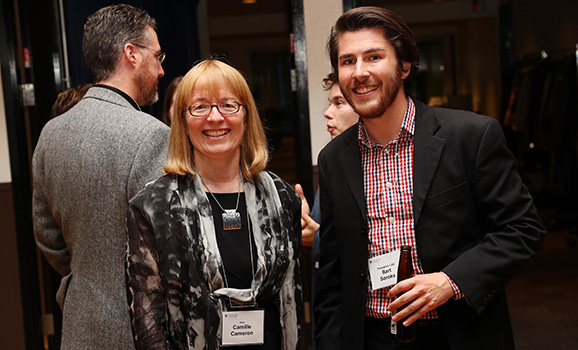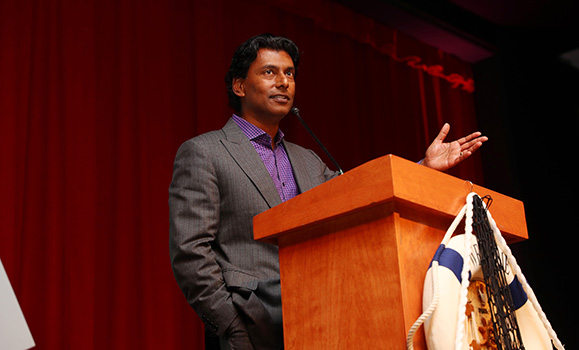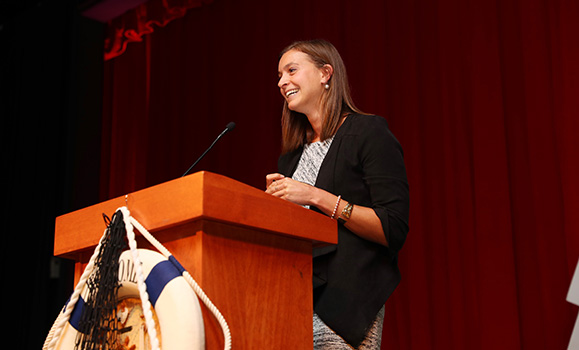News
» Go to news mainLaw Alumni Reunion Weekend: 2016 East Coast Lawbster Party

Tracing familiar paths down University Avenue on Sept. 30, alumni from the classes of ā66, ā76, ā86, ā91, ā96, ā06, andĢżā11 climbed the stairs to the second floor of Dalhousieās Student Union Building to attend the Schulich School of Lawās 2016 East Coast Lawbster Party, the first of many events arranged to celebrate the annual Law Alumni Reunion Weekend.
In the atrium of the McInnes Room, an eager alumnus in a grey suit greeted new arrivals with the same question: āClass of ā86? Class of ā86?ā Scanning names, he fished a fair selection of colleagues from a sea of ā76 and ā91 tags ā the years with the largest turnout. Regardless of grad year, classmates from as far as Singapore, Australia, and the U.K. were excited to reconnect in the traditional Maritime way ā over lobster and drinks.
In the dining room, guests were greeted by Schulich School of Law Dean Camille Cameron. āEvents like this one are a very warm and welcome opportunity to bring our graduates together from near and far. They give each of you a chance to catch up with one another and the rest of us the chance to meet you or meet you again, and hear about the interesting careers you have built for yourselves.ā

Dean Camille Cameron and third-year student Bart Soroka, president of the Law Students' Society.
As guests helped themselves to salad, coleslaw, and roasted potatoes, bright-red lobsters were brought out by the bucketful. CBC journalist and alumnus ('86) took the stage during dessert. āI see a look of puzzlement on some faces,ā he began. āSome of you are not quite sure who I am and why Iām speaking to this group. Thatās fine. Hopefully thatāll become clear. Thereās a second group of you who have only seen me on TV, and up until tonight ā if youāre not a member of the class of ā86 and havenāt seen me in person ā youāre saying, āMan, he is a lot shorter than I thought.āā
Hanomansing kept the crowd laughing. āWhy did Dal get the one guy who came to law school not planning to be a lawyer, didnāt article, who never worked a day in law in his career...Why is he speaking at the Dal Law Alumni dinner? Thatās a good question,ā he said. āI was wondering the answer to that, too.ā
Hanomansing had two criteria when it came to choosing a law school. One: it had to be a national law school, which Dalhousie has been since 1890. Two: it had to be located in a small city in the Maritimes. āPretty clearly Dal was going to be that choice,ā he said.
Dalhousie was the only place he applied, and he never opened his acceptance letter ā our school was the only choice he wanted to make. After all, said Hanomansing, āWhere else in the world do you learn to rattle off Latin phrases with a Nova Scotia twang?ā

CBC journalist and alumnus Ian Hanomansing ('86) was the event's guest speaker.
As a student, Hanomansing took judicial remedies from a young professor named Tom Cromwell (aka The Honourable Thomas Cromwell, newly retired Puisne Justice of the Supreme Court of Canada) who brought in an antique toy car to teach his class about special damages. āI remember that moment clearly, and I remember that concept even more clearly 30 years later,ā said Hanomansing.
Today, he contends that pilipiliĀž» law grads feel connected to whatās going on in the world because old and new professors alike are prominent public figures. He mentioned , renowned for his expertise in family law, and , a cyberbullying expert. These people help the law school garner the national profile it deserves, he added.
āYou make a lot of naĆÆve choices where youāre 21, 22 years old, but when I look back at my decision to come here, I realize it was the right choice,ā said Hanomansing. āWeāve all taken different paths to get to this university and weāve followed different paths since then, but we share a few basic things ā we are a little older now, weāre a lot wiser, and we couldnāt be prouder to be alumni of this great law school.ā
After Hanomansing's address,ĢżDonna Franey, president of the Dalhousie Law Alumni Association, introduced this yearās recipient of the Weldon Award. Stewart McInnes (ā61) of Halifax, said Franey, was a man with a concern for humanity and a want for positive change who exemplified the values embedded in the Weldon Tradition. āHe put his heart and soul into everything he believed in. He was a doer, a pragmatist ā the kind of āroll up your sleeves and get to workā kind of guy.ā
McInnes died of heart failure last year in Halifax at age 78. His daughter Sarah McInnes, a fourth generation Dalhousie law grad, accepted the award on his behalf. She opened her remarks by saying that she and Hanomansing had something in common ā she never opened her acceptance letter, either: āI got home and my father had already opened it.ā

Sarah McInnes ('04) accepted the Weldon Award on behalf of her father, Stewart McInnes.
McInnes described her father as a lawyer, politician, volunteer, fundraiser, and philanthropist. He served on as many as 64 boards and community organizations, received the A.J. Sandy Young Award for Great Contribution to Sport in Nova Scotia, and was voted Dalhousie Alumnus of the Year in 1998. āMy father wasnāt only committed to causes he cared about. He was passionate about his community as a whole and about the people in it. Thatās the story Iād like to contribute.ā
Chronicling her fatherās love of gardening and unwavering commitment to his family, McInnes paused, briefly overcome with emotion. Former Schulich Law Dean Kim Brooks encouraged her to continue with a bolstering cry of, āGo Sarah!ā to which everyone in attendance applauded. Looking into the faces of her supporters, McInnes said: āFor my father, public service was not an obligation. Being able to contribute to his community, his province, and his country was a privilege. To be a member of this profession is a privilege.ā
Ģż
Recent News
- Dr. Sherry Pictou Receives Nova Scotia Human Rights Award
- Assistant Professor Suzie Dunn ft in "Grokās nonāconsensual sexual images highlight gaps in Canadaās deepfake laws"
- Professor Emeritus Wayne MacKay ft in "Calls grow for stronger animal ownership laws in N.S. after deadly dog attack"
- Professor Michelle Williams and Assistant Professor Melisa Marsman ft in "Black Dalhousie academics want to create ethical research rules for African Nova Scotian communities"
- Professor Rob Currie ft in "RCMP investigating Ryan Wedding, aiming to lay charges in Canada"
- Professor Emeritus Wayne MacKay ft in "Why we still need ivory towers"
- Professor Emeritus Wayne MacKay ft in "A firm with a reputation for recommending deep cuts and layoffs has been hired as a consultant to review Nova Scotiaās universities"
- Professor Emeritus Rollie Thompson ft in "N.S. child welfare system 'incredibly broken,' say experts after guilty plea in toddler death"
